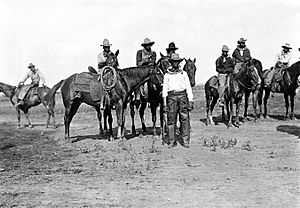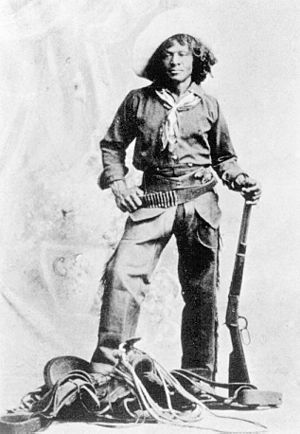Black cowboys facts for kids

Black cowboys played a big role in the American West. From the 1860s to the 1880s, about 25% of all cowboys who moved cattle were Black. This means thousands of Black cowboys worked in the ranching business.
Many Black men had been slaves and knew a lot about handling cattle. After the Civil War ended, they headed West looking for new chances. Even though there was still some unfair treatment, the cowboy industry often paid Black and white cowboys the same. They also gave them similar jobs.
For example, a group moving cattle might have seven or eight white cowboys, three Black cowboys, and one or two Mexican cowboys. One Black cowboy might be the cook, another might handle the horses, and a third would be a regular cowboy. Black cowboys did many jobs, from handling horses to being top hands or cooks. However, they were almost never the main boss of a ranch or a cattle drive, unless it was an all-Black group.
Contents
Why Black Cowboys Went West

After the American Civil War, the South went through a period called Reconstruction. Even then, many freed slaves in the South were not allowed to own land or have other important rights. Because of this, about 20,000 Black people, called Exodusters, moved to Kansas between 1879 and 1884. Smaller groups moved to other Western states too.
Many Black cowboys learned their skills from Mexican vaqueros, Native Americans who raised cattle, or even their former masters. They then worked on ranches for wages. These jobs offered more opportunities than they could find in the South.
Before slavery ended, working with cattle gave slaves a lot of freedom compared to other jobs. They were often given guns, rode horses alone for long times, and were trusted to return. In Texas, white ranchers used to call white workers "cow hands" and Black workers "cow boys."
Free Black cattle drivers moved cattle from Kansas to places like Atlanta, the Dakotas, and Canada. They also went to New Mexico, Arizona, California, and Oregon. Some freed slaves even stayed and worked for their former masters. As more people settled in these areas and better ways to transport goods appeared, the time of moving cattle over long distances slowly ended.
What Black Cowboys Did
Black cowboys often got the tough job of handling wild or difficult horses. This job was called horsebreaking. Other important jobs included being a trail cook. Cooks often earned more money than other cowboys, no matter their race. Black chefs would make meals like biscuits, beef, and coffee. They also hunted deer and wild turkey for food.
Black cowboys were also expected to entertain on the trail. They would sing or play musical instruments. Some even worked as bodyguards or carried money because thieves were less likely to search a Black man for large sums.
For example, Bose Ikard worked as a trusted banker for rancher Charles Goodnight for many years. Bill Pickett was famous for inventing a rodeo skill called bulldogging. This is where a cowboy jumps from his horse onto a steer and wrestles it to the ground.
There were also Black women cowboys, but we don't know how many. Women usually didn't own ranches or continue working in ranching. It was hard for freed Black women to find work with white ranchers.
Rodeos and Challenges
Buffalo Bill Cody made Wild West shows popular across the United States starting in 1873. These traveling shows displayed skills and characters from the West, including rodeo roping and other acts. Among the performers, African-American cowboy Jesse Stahl was well-known for his amazing saddle riding skills.
However, racism was common in rodeo competitions. Sometimes, judges would use unfair reasons to give lower scores to Black riders. Black rodeo riders were sometimes compared to animals, which was not fair. Because of this unfair treatment and Jim Crow laws (which enforced segregation), Black cowboys created their own "soul circuits" for competitions. Later, they formed the Southwestern Colored Cowboys' Association. Many African-American cowboys took part in these events, especially in Texas, up until the 1940s.
Challenges Black Cowboys Faced
Life on the cattle trail could be fair, with white and Black cowboys sharing sleeping areas. But when they were around white women, the unfair rules of society would return.
Cowboys who moved cattle were usually not paid a lot, but they earned more in the northern states. Pay was often different for each cattle drive and even among cowboys on the same drive. While Mexican ranchers often earned much less than white cowboys, there is little proof that Black cowboys were paid less than white cowboys for the same work. However, Black employees might have been expected to work harder and longer hours.
Many Black cowboys took on extra jobs like laundry, checking water in streams, and taking late-night guard shifts. They were also often the first to ride difficult horses. Even though there were many all-Black cattle drives, Black cowboys rarely became a foreman or manager. They often had to train white cowboys, who would then get the higher positions. Some Black cowboys decided to buy their own land and raise their own cattle instead.
Traveling also brought challenges. Saloons were usually separated by race. White and Black cowboys might meet in the middle, but restaurants were different. Black men were often not allowed to sit in town restaurants if there wasn't a separate Black-only place. They would have to order food from the back door. Most Black cowboys bought food and cooked it themselves on the trail. However, Black men were usually welcome in gambling halls.
Black Cowboys in Stories
Black cowboys are featured in stories and books. For example, a 2019 novel by Russ Brown called Miss Chisum tells a story about cattle baron John Chisum and his relationship with a slave.
Images for kids
 | DeHart Hubbard |
 | Wilma Rudolph |
 | Jesse Owens |
 | Jackie Joyner-Kersee |
 | Major Taylor |



